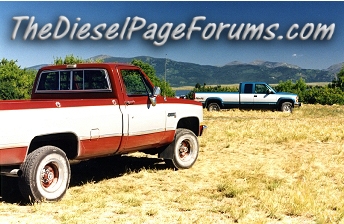
Originally Posted by
DmaxMaverick

Almost any OEM fuel injection pump can and will (if healthy) provide more fuel pressure and volume than the 6.2L engine can (sustainably) survive. Timing can be advanced, and advance cam adjusted/modified to optimize combustion. An electronic IP (DS4) would increase the flexibility across a greater power range, but the ultimate usable fuel supply limits are no greater. The caution is keeping EGT's within a reasonable limit for the duration. i can add some water meth later if needed, but we are talking about a 60mm wheel with a almost unlimited hot side, and a intercooler. I dont know if a .310 pump could push enough fuel to get hot in a automatic 5000lb truckAn intercooler and more efficient turbo go a long way to increase the output within the limits. Be aware, though, the situation you have created WILL force the powertrain to seek a point of failure it was previously designed to withstand. I suggest start building its replacement before it needs one (now is a good time).
the rest of the driveline is pretty heavy, built th400, 205, 14bolt/d44, etc
Fuel pressure should be no more than about 12 PSI, with constant positive volume. The IP does the high pressure heavy-lifting, and ONLY needs a minimal positive fuel supply (above zero pressure, at all times). The fuel injection pump performance is affected by housing (return) pressure. The recommendation you reference regarding where to regulate the pressure (being after the pump), refers ONLY to the fuel lift pump (gassers don't generally have a fuel injection pump). Gassers with fuel injection rely on the lift pump to provide fuel injector pressure, very much unlike that of Diesels. 60 PSI at the IP inlet is excessively too high. Either regulate it to ~10 PSI before the IP inlet, or use a more appropriate fuel lift pump.






 Reply With Quote
Reply With Quote


